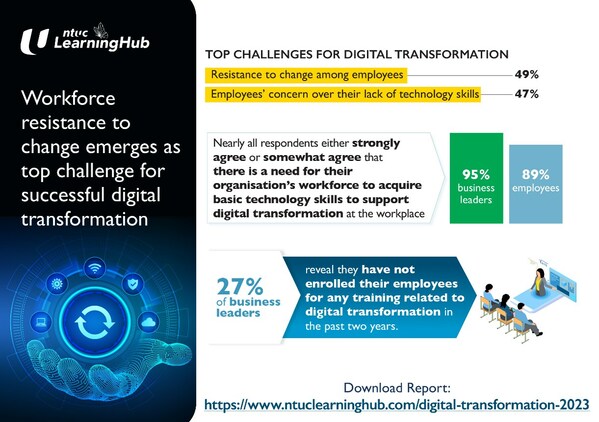Workforce Resistance to Change Emerges as Top Challenge for Successful Digital Transformation

Half of business leaders (49%) reveal that the top challenge for digital transformation is employees' resistance to change,while half of employees are most concerned about their own digital proficiency (47%).
Nearly all (95% of business leaders and 89% of employees) either strongly agree or somewhat agree that there is a need for their organisation's workforce to acquire basic technology skills to support digital transformation at the workplace.
Yet,nearly a third of business leaders (27%) say that they have not enrolled employees in any training related to digital transformation in the past two years,while almost half of employees (43%) are unaware of the training programmes available in the market.
SINGAPORE,May 31,2023 -- In this age of rapid digital evolution,companies are increasingly embracing digital transformation. However,half of business leaders (49%) reveal that the top challenge for digital transformation is employees' resistance to change,while half of employees (47%) are most concerned about their own lack of technology skills (47%).

Workforce Resistance to Change Emerges as Top Challenge for Successful Digital Transformation
Nearly all (95% of business leaders and 89% of employees) either strongly agree or somewhat agree that there is a need for their organisation's workforce to acquire basic technology skills to support digital transformation at the workplace. Despite this,nearly a third of business leaders (27%) say that they have not enrolled their employees in any training related to digital transformation in the past two years,while almost half of employees (43%) are unaware of the training programmes available in the market.
These are some of the key findings from the recently launched NTUC LearningHub's Digital Transformation Report 2023,which aims to explore the current landscape of digital transformation in Singapore including familiarity,readiness,adoption rate and challenges. Based on a survey of 150 business leaders and 300 full-time working professionals,the report also investigated the importance of learning and development (L&D) and identified priority skills needed to support digital transformation at the workplace.
In addition to the lack of technology skills (47%) – cyberattacks (43%),job security or being replaced by technology/ automation (42%),lack of adaptability (35%),and digital transformation being unable to improve their daily work (29%),are the top five concerns employees have about digital transformation.
A third of employees also reveal that they do not use any technologies,such as cloud computing,big data,or Internet of Things (IoT) in their daily work (34%),and are unaware of digital transformation initiatives at the workplace (31%).
Three in five respondents (87% business leaders,74% employees) acknowledge that there is a gap in expertise on how to adopt digital transformation in their organisation. In fact,more than four in five (84%) business leaders agree that their organisation requires external help to analyse the workforce's skills gaps in order to implement digital transformation.
Nonetheless,most employees agree (29% strongly agree,66% somewhat agree) that it is important for their organisation to embark on digital transformation. A majority (88%) also report that they are comfortable with using technologies and tools needed to support digital transformation at their workplace.
Commenting on the survey findings,Anthony Chew,Chief Core Skills Officer at NTUC LearningHub,says,"It is encouraging to see that both business leaders and employees recognise the importance and need for digital transformation. However,findings show that there is resistance on the ground. Knowing exactly what to transform and how to execute the digital transformation plans can be daunting to leaders. As for employees,one of the main reasons for workforce resistance to digital transformation is their concern over job security. Thus,it is about building a conducive environment for workplace learning to empower employees with new competencies,assure them of job security,and enable them to pivot into adjacent job roles within the organisation. More importantly,leaders at the workplace need to ensure that every employee is aligned with the organisation's business strategy and implementation plans towards digital transformation."
To download the Digital Transformation Report 2023,please visit https://www.ntuclearninghub.com/digital-transformation-2023.To find out more about embarking on Digital Transformation,visit NTUC LearningHub's website at www.ntuclearninghub.com/digital-transformation.
About NTUC LearningHub
NTUC LearningHub is the leading Continuing Education and Training provider in Singapore which aims to transform the lifelong employability of working people. Since our corporatisation in 2004,we have been working with employers and individual learners to provide learning solutions in areas such as Cloud,Infocomm Technology,Healthcare,Employability & Literacy,Business Excellence,Workplace Safety & Health,Security,Human Resources and Foreign Worker Training.
To date,NTUC LearningHub has helped over 26,000 organisations and achieved more than 2.6 million training places across more than 2,900 courses with a pool of about 900 certified trainers. As a Total Learning Solutions provider to organisations,we also forge partnerships to offer a wide range of relevant end-to-end training. Besides in-person training,we also offer instructor-led virtual live classes (VLCs) and asynchronous online learning. The NTUC LearningHub Learning eXperience Platform (LXP) — a one-stop online learning mobile application — offers timely,bite-sized and quality content for learners to upskill anytime and anywhere. Beyond learning,LXP also serves as a platform for jobs and skills development for both workers and companies.
For more information,visit www.ntuclearninghub.com.